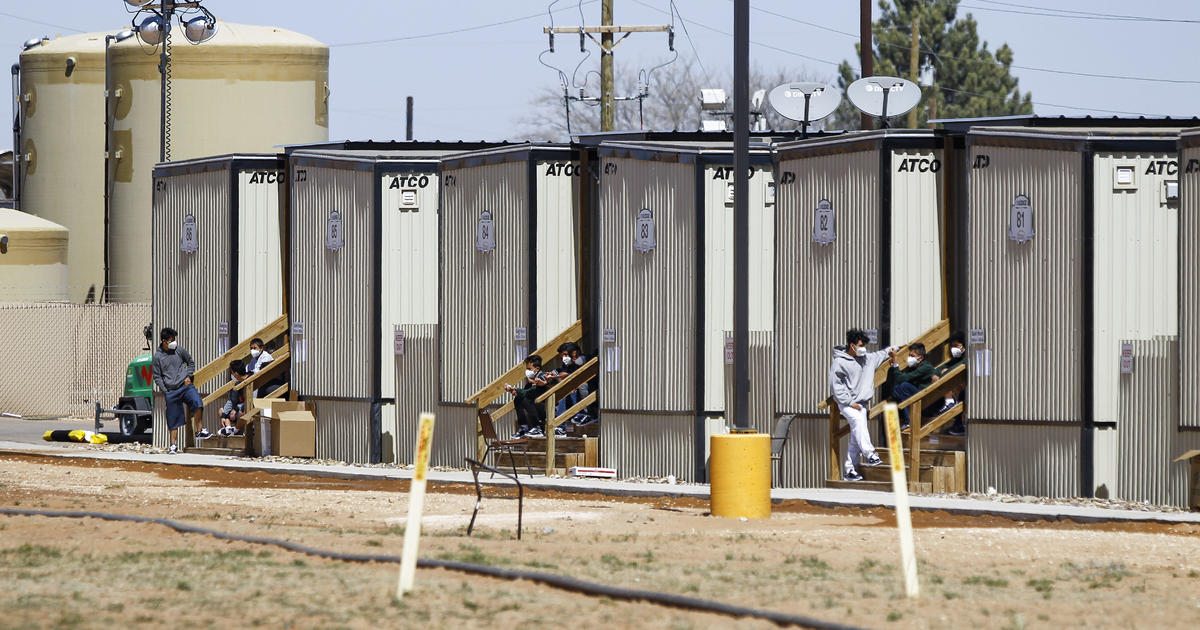The U.S. government on Saturday sheltered some 15,500 unaccompanied migrant minors, including 5,000 teenagers and children trapped in border patrol facilities not designed for long-term custody, according to government data analyzed by CBS News.
On Saturday morning, more than 5,000 unaccompanied minors were detained in a Customs and Border Protection (CBP) tent in southern Texas and at other stations along the border with Mexico. According to government records, unaccompanied children spend an average of 136 hours in custody of CBP, well beyond the 72-hour limit established by U.S. law.
The Department of Health and Human Services (HHS) was also housing about 10,500 unaccompanied children in emergency accommodation facilities and shelters licensed by the states to care for minors, department spokesman Mark Weber told CBS News on Saturday. .
More than 9,400 unaccompanied minors entered custody at the U.S. border last month, a record for February. This number is Expected to be eclipsed by the March numbers, as border officials found an average of more than 500 unaccompanied minors a day for the past 21 days, according to government data.
The refugee agency within HHS is in charge of housing the majority of unaccompanied minors until it can place them with relatives or other sponsors in the United States. Because of the high number of unaccompanied children crossing the southern border and limited space to sleep in their state-licensed shelters, the U.S. refugee agency was forced to open makeshift accommodation to take children out of Border Patrol custody. .
Eli Hartman / AP
On Saturday, HHS notified Congress that it would open a new influx facility in Pecos, Texas, which was initially expected to house about 500 unaccompanied children, according to a notice obtained by CBS News. HHS said the facility, a former housing for oil workers, could be expanded in the future to accommodate up to 2,000 minors.
The Pecos facility would become the fourth influx or emergency accommodation for unaccompanied minors opened by the Biden administration, which is struggling to find a place to sleep for the growing number of children arriving at the US-Mexico border without parents or legal guardians. The Trump administration used three influx facilities for migrant children over the course of four years.
Last month, the U.S. refugee agency reopened a Trump-era influx facility in Carrizo Springs, Texas. With the help of the Federal Emergency Management Agency, the refugee office has also converted a Dallas convention center and a field for oil workers in Midland, Texas, into emergency locations to receive unaccompanied teenagers trapped at the Border Patrol facilities, the most of which were built to detain migrant men.
The figures analyzed by CBS News on Saturday show that the United States government continues to struggle to reduce the record number of children in custody at the United States’ border, while opening new housing facilities and increasing the capacity of beds in state-licensed shelters.
“The impressive number of children in custody of CBP is both painful and deeply worrying,” Neha Desai, a lawyer representing minority migrants in a historic court case, told CBS News.
Last week, Desai and his colleague at the National Center for Youth Law, Leecia Welch, interviewed minor migrants detained in the Border Patrol tent in Donna, Texas. According to Desai, the children reported taking turns sleeping on the floor because of overcrowding conditions; not being able to call family members; and bathe once in up to seven days.
Desai said he believed that “the Biden government is committed to dealing humanely with the humanitarian situation we now face”, but that “time will tell whether the government’s good intentions and hard work will translate into the changes that are urgently needed”.
On Friday, Paul Wise, a court-appointed doctor in charge of monitoring conditions faced by migrant children in U.S. custody, told U.S. District Court Judge Dolly Gee that she found “deep overcrowding” in Donna prison and elsewhere. CBP stations in South Texas that he toured last week.
Wise warned that overcrowding conditions are not “sustainable”, saying that retention capacity along the southern border could begin to deteriorate.
CBP told CBS News in a statement that it is working to transfer unaccompanied minors to HHS shelters “as soon as possible”. Echoing statements by Homeland Security Secretary Alejandro Mayorkas, the agency said the Border Patrol detention facilities “were not designed to keep children for long”.
“Even a few hours in custody is more than we want for the children that the border patrol seizes at the border,” the agency said in a statement.
As the Centers for Disease Control and Prevention (CDC) allowed shelters to relax social detachment measures and return to pre-pandemic capacity in early March, the U.S. refugee office reactivated more than 500 beds, a spokesman said. agency’s voice to CBS News earlier this week.
Although the refugee agency is no longer considering using a military base in Virginia or a NASA facility in northern California to house unaccompanied children, it is still evaluating other locations, according to Weber, the HHS spokesman.
Citing a public health official dating back to the late 19th century, the Trump administration summarily expelled thousands of unaccompanied children from the southern border without allowing them to apply for asylum until a federal judge blocked the practice in November 2020.
While an appeals court suspended the judge’s order in late January, the Biden government refused to expel unaccompanied migrant children, considering the inhumane practice. The Biden government continued to use the Trump era public health edict to expel migrant adults and some families with children.
“We made a different decision from the previous administration,” Mayorkas said on “CBS This Morning” on Thursday. “We do not expel children back to the environment of poverty and violence from which they are fleeing.”

